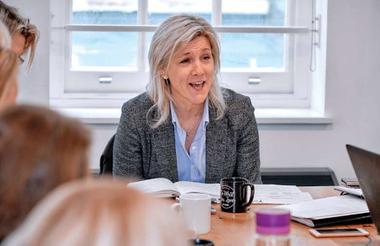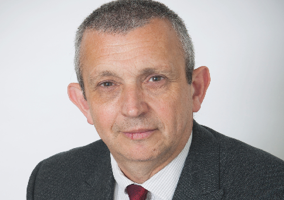Nothing predestined Sharon Davies to lead a national charity. After leaving home at the age of 16, she had a few “turbulent years” before finding her path in life.
“I didn’t really feel like going to sixth form or that further education was accessible to me,” she says.
It was a chance encounter with a stranger that shaped her future. While working at a supermarket, a youth worker spotted Davies dealing with a group of young boys. The worker saw some skills in her in the way she was handling them and invited her to do some voluntary work in a youth club.
At first, Davies turned down the offer, which she thought was not suited for her. But then the youth worker came back, insisting that she had “a special talent for working with young people”. Eventually, she agreed to give it a go.
“He gave me a chance to work in a detached youth work setting where you’re working on the street with young people who choose not to go to youth club, so gangs essentially.”
Davies immediately “loved it” and began volunteering there regularly before working part-time. For the next few years, she worked as a full-time youth worker and went to university to study for an MBA.
“What that enabled me then to do was to think about a career in a charity to put my MBA to good use, which is basically using business within a charity setting. That’s what brought me to Young Enterprise as an operations director about 14 years ago.”
‘Sometimes, it’s the setting that doesn’t work for young people’
Davies explains that one of the reasons that pushed her to leave home at an early age was her sexual orientation. As a gay woman living in a “very rural” area, she found it extremely “difficult to live that lifestyle”. “I went to live in Manchester and it was just a lot easier there,” she says.
Back then, Davies did not consider herself a “successful learner” nor even think she was “good at anything”. For her, crossing paths with that youth worker was transformative. “I’ve had a career of 30 years working and supporting young people based on that one experience of someone who believed in me, invested in me and kept backing me when I was very unsure about myself and my future.”
She adds: “All of a sudden, someone was validating me as a person and what I realised is that sometimes it’s the setting that doesn’t work for young people. You can learn and be successful, you probably just need the right setting, opportunity and support.”
The opportunity she was given to work with young people who were excluded from school was “brilliant”. “I had this group of 15-20 lads and girls who you could work with over three or four weeks to help build that relationship and give them opportunities to be successful at learning in a different setting. How amazing is that? It’s just the opportunity to give back.”
Finding new ways to deliver services
Davies became chief executive officer of Young Enterprise in 2019. Before that, she had been the charity’s chief operating officer for seven years.
Young Enterprise is an employability and financial education charity that focuses on entrepreneurship, financial literacy and work readiness. According to its latest accounts for the year ending 31 July 2021, income was £5.8m, a 20% increase on the previous year.
National fundraising, which makes up 81% of the charity’s total income, nearly doubled to £4.7m.
Davies says the charity worked hard to retain its long-standing donors. “We’ve been really grateful for the amount of support that we’ve had from donors who have committed to the vision of increasing opportunity and support for young people. I think more and more supporters understand the importance of getting to those areas where young people just aren’t getting an opportunity.”
Like many charities, Young Enterprise was not immune to the Covid-19 pandemic. Davies says the impact of the virus on young people has been disproportionate, uneven and expedited existing barriers to social mobility.
However, young people showed themselves to be “extraordinarily resourceful and resilient, often with very limited resources,” she says. “What we as a charity needed to do was react and adapt to what young people’s and educators’ changing needs were. A lot of our events were physical and we couldn’t do them anymore.”
For instance, when schools stopped operating, the charity made its resources freely available so that educators and parents could continue to provide financial and enterprise education from home. It also developed online resources to continue to meet beneficiaries’ needs.
“As an organisation, we’ve built a culture that is very much around test and learn, allowing people to fail, and if that something doesn’t work then we learn about why it doesn’t work and do something differently. In lots of ways, the pandemic helped us adapt and innovate to respond to young people’s changing needs.”
Tackling inequalities of access to opportunity
In 2020, Young Enterprise published a three-year strategy called No Time Like the Future.
Davies says the charity has made good progress against it. In October last year, it created one million enterprise and financial education opportunities. “We’ve engaged around 26,000 volunteers, alumni and educators so we’ve got about 14,000 to go with our plan of mobilising 40,000.”
The charity has also given equality, diversity and inclusion training to all its staff.
“If you’re serious about having relevant and relatable role models for young people, you need to bounce and engage with the diversity of communities that we serve. What we wanted to do was make sure that everybody was clear about that and be able to unpack any prejudice, unconscious biases and all of those things that we’ve got.”
Lack of inclusion in the sector
Davies says that she has always struggled with the absence of leaders with a similar background to hers in the charity sector. “[Socio]economic status is a real barrier. People would take the mickey out of my accent and it took me a while to become comfortable with me. That’s who I am, really.
“I still go to big dinners and still worry about which cutlery to use first, inside out or outside in? It’s those things that some people are brought up with, but I wasn’t. It’s those things that you just feel a little bit of an outsider with.” Surprisingly, perhaps, she says she has not experienced any difficulty due to her sexuality or gender.
The lack of role models in the sector, particularly in leadership positions, is a real issue, she says. She feels that as someone whose passion is to support young people and give them access to opportunities, the onus is on her to lead by example and show that everything is possible.
Getting ready for the next 60 years
This year, Young Enterprise is turning 60. The charity’s upcoming new strategy will set out how to measure the impact of working with young people who are furthest away from opportunity.
Davies says: “We’ll be investing much more on understanding the impact of the work that we do so that we can continue to provide young people with opportunities beyond Young Enterprise.”
Throughout 2023, the charity will run a series of events that celebrate its heritage and track record.
“More importantly, we’ll be signposting into the future, so talking about the importance of being adaptable, relatable and relevant in the future,” says Davies.
In September, the charity plans to publish a reimagined “company programme”, updating the first scheme that the charity delivered in its founding year of 1963. The new programme with will be more digital-focused and led by young people, who will be able to monitor their own learning, says Davies.
‘I always approach things with humility’
Asked whether she is confident about the future, Davies says: “I would always approach that with humility and never complacency.
“Confidence is a strong word. I’m excited, inspired and hopeful. It’s a very tricky and complex economic environment. You’ve got to be focused on what it is you feel that you can add to young people’s futures. What we can do is to be adaptable and respond to young people’s needs.”
Related articles












